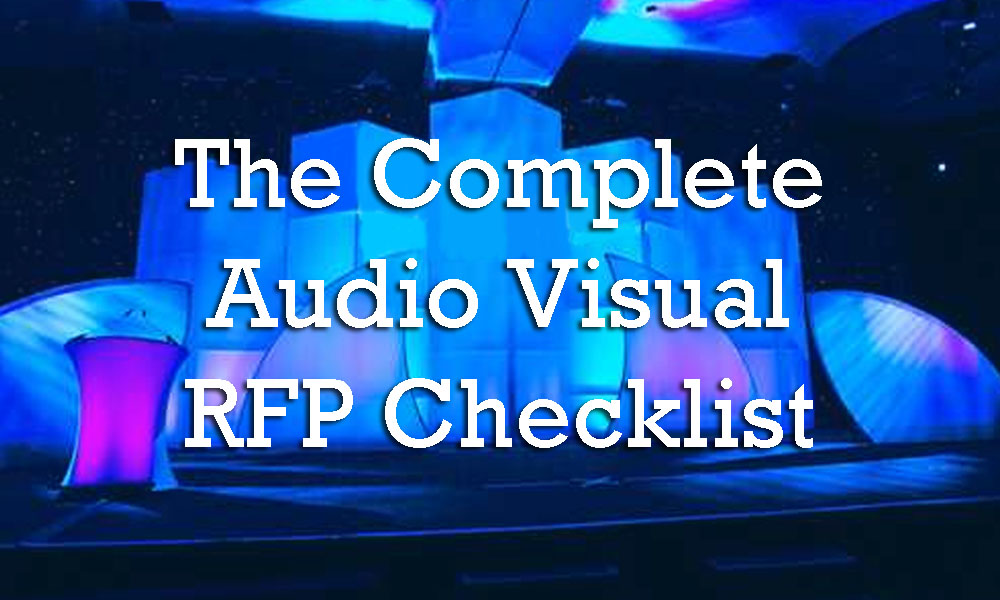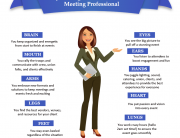The Complete Audio Visual RFP Checklist
It’s finally here!—a full breakdown for building your Audio Visual RFP. Going through the bidding process can be overwhelming. We went through all the factors that need to be considered when planning the audio visual portion of your event to provide a checklist that will ensure you have everything you need- without the headache.
The most important part of this checklist is communication. No matter if you are working with a new vendor, or with a provider you’ve known for years, it is always best to communicate your expectations openly and effectively long before the event starts. If you’re not sure what your expectations are (or should be) ask your potential AV partners to conceptualize it for you- get a few different perspectives on this and form your own opinion.
Venue Site Visit:
- Always send your RFP out in time to allow for your eventual vendor to travel with your team on site visits. They will be able to offer a unique perspective to help you plan audio visual in the most engaging and cost effective way.
- Does the venue have in-house audio visual? If so, is there a surcharge for bringing in a third party vendor? Are there liaison fees? To discover how to avoid charges for bringing in a third party vendor, and maintain the freedom to choose the best provider for you, check out our post on requested concessions, here.
- Is the space laid out in a way that will allow for staging, AV, and attendee comfort? Use the 20% rule when visiting potential venues; take their respective capacity charts and deduct 20% off the total to allow for production and staging.
- Include measurements and floor plans in your RFP. This will ensure your vendor is familiar with the space and can accurately determine how the set can and will be designed.
- Test the in-house sound system, and ask what the surcharge is for an outside vendor patching into the system. This may save you the cost of outsourcing sound to a third party vendor.
- Before signing your contract, ask to see the guidelines of the venue. Are there surcharges for power? Liaison fees? House sound patches? Familiarizing yourself with all possible budget constraints will help educate you of all possible charges and not just those which may be referred to in the black letter of your space agreement.
- Also familiarize yourself with the items which come free of charge with your agreement; i.e. – Tables, chairs, podiums, staging, etc. Always remember to keep your larger session spaces on a 24-hour hold to assure another event is not booked over your dates in the space you are using – this will save on equipment and labor fees.
- Double, and triple check your contract to see when the rooms will be available for equipment set-up. Try to book setup time at least 1 day before your event begins to allow your vendor proper time to test all equipment as well as leave time for rehearsals. Also check what time you need to be out of the rooms after your event so your strike team can plan accordingly.
The RFP Cover Page:
To educate potential vendors quickly, and avoid having to answer the same questions repeatedly, create a cover page that includes the following details:
- Event Overview and Objective
- Title of the event and theme
- Event Dates, City, and Venue
- Expected conference attendance
- Expected breakout session attendance
- Attendee demographics
- Mission/Vision of Conference
- Number and type of sessions (i.e. General, Plenary, Breakout, BOD, etc.)
- Budget- Do not be secretive with this detail, include your vendor in planning so they can help you with creative, cost effective ideas.
- RFP Overview
- What are you looking for in a potential AV partner?
- Are you requesting a discount?
- Do you want to hear about the newest and most cutting edge trends?
- Are you looking for a long-term or one-time production partner?
The RFP Meat and Potatoes:
- Does your organization require a proof of insurance? Let your vendor know if your group will need to be added to the vendor’s insurance.
- Will your selected AV partner be responsible for scheduling and paying Union Labor (if applicable), or will you, the client, be handling this aspect? These charges will be dependent on your venue, yet are important to you and your AV partner for planning purposes.
- Labor Charges. This is a line item that AV companies cannot discount.
- Specify whether or not you want your vendor to set-up and strike equipment.
- Would you like an on-site tech for the duration of your conference? Specify the hours you would like to have a technician on-site.
- Keep in mind that long, very early, and late night hours will come at an inflated rate. Most companies will charge a day rate for a 10-hour call, anything above that time is generally booked at 1.5 times the hourly rate.
- Are you accepting bids from national vendors? Specify the number of staff rooms available for the production staff in accordance with your event size. On many occasions, entering into a long-term partnership with a production vendor will lock in equipment pricing, which allows companies to travel with a consistent staff of lead technicians, saving on conference time management and labor.
- Equipment Requirements
- Include any specific equipment requirements requested by your presenters.
- Will you be using internet at the venue, or is this a service you are looking for your AV partner to provide?
- Will you need equipment networked? These details allow for your vendor to better determine your labor needs.
- Room set-up. While you have already included the audience size in your cover page, include the room set-up to allow your AV partner to plan the most seamless set-up (i.e. 80 attendees set in 10 rounds of 8, or 80 attendees set theater style).
- Have you arranged for a stage to be provided, or will your AV partner be responsible for providing this? Include stage size and how it will be used (i.e. for panels, performance, presentations, etc.).
- State whether you will want equipment to be floor standing or flown. Keep in mind that rigging will be required for flown equipment, yet room layouts may require this set-up. Talk to your AV partner, they will be able to guide you on the best practice for your particular event.







Leave A Comment